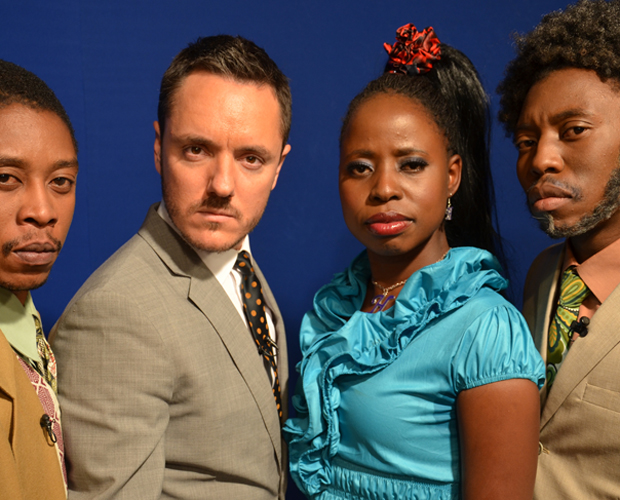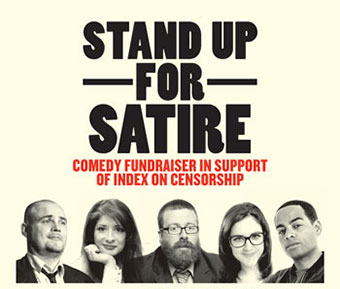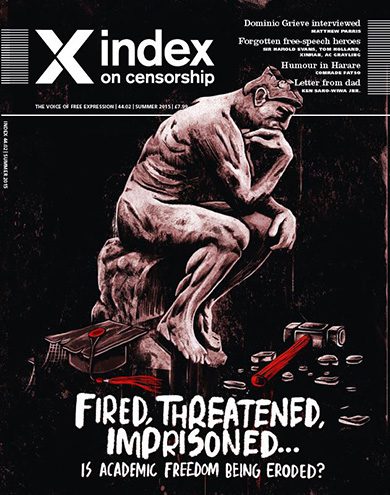14 Jul 2015 | Magazine, mobile, Volume 44.02 Summer 2015, Zimbabwe

Zambezi News cast, pictured left to right – Michael Kudakwashe, Samm Farai Monro, Chipo Chikara and Tongai Makawa
The Zimbabwean Minister of Impending Projects proudly stands in front of a mine that he has christened Mine Mine. “Because,” he says, “it’s mine. And because a diamond mine is a minister’s best friend.” This corrupt politician who has never completed a single programme in his department, is a fictional character on Zambezi News, a satirical show I helped create, with fellow activist Outspoken.
Zambezi News has become Zimbabwe’s leading satirical programme, reaching millions of viewers across the country and the whole continent. The show is a parody of the state-controlled propaganda machine, the Zimbabwe Broadcasting Corporation, and mimics the station’s sycophancy to the ruling party, the Zimbabwe African National Union Patriotic Front (Zanu PF). Quite frankly, our show started off by fluke. Outspoken and I have a background as spoken word and hip-hop artists and were approached by a friend involved in a local film festival to do a live news skit. When it aired at the festival and was really well received, we knew we were on to something.
We shot the first season in 2011 as a faux news show with three comic newscasters. The show cut between the newsroom and satirical reports from the field and featured a string of outrageous characters. We even did a special episode for the 2013 elections where our newscaster, Mandape Mandape, showed how easy it is to vote – unless you are young, urban and likely to vote for the opposition. We publicised the show around the country using partners ranging from community radio stations to activist groups. We also pushed it heavily on social media and shared the videos on YouTube. Interest was so great we then produced 10,000 DVDs, which were requested in more than 100 different towns and villages in Zimbabwe. Since then we have shot two more seasons. The show has been viewed by six million Zimbabweans, and we have been invited to do live shows in Sweden, South Africa, Swaziland and the USA.
The fact that there is thriving satire in Zimbabwe and that we, as the cheeky cast of Zambezi News, are still alive confuses a lot of people. Most TV and radio in Zimbabwe is controlled by the state or cronies of the ruling party, so the public has a growing appetite for comedy and satire that present an alternative voice. People like to laugh and think about our crazy situation at the same time.
“Political satire has provided comic relief to many Zimbabweans, but, above all, it has been an innovative way of speaking truth to power,” said political commentator Takura Zhangazha. “Zambezi News is key in carrying on this tradition especially across various media spectrums and between generations.” The fact that we’re still alive? Well, I guess that’s down to luck and the fact that we hide in plain sight.
 Index on Censorship has been publishing articles on satire by writers across the globe throughout its 43-year history. Ahead of our event, Stand Up for Satire, we published a series of archival posts from the magazine on satire and its connection with freedom of expression.
Index on Censorship has been publishing articles on satire by writers across the globe throughout its 43-year history. Ahead of our event, Stand Up for Satire, we published a series of archival posts from the magazine on satire and its connection with freedom of expression.
14 July: The power of satirical comedy in Zimbabwe by Samm Farai Monro | 17 July: How to Win Friends and Influence an Election by Rowan Atkinson | 21 July: Comfort Zones by Scott Capurro | 24 July: They shoot comedians by Jamie Garzon | 28 July: Comedy is everywhere by Milan Kundera | Student reading lists: Comedy and censorship

However, being a leading satire show and poking fun at the powerful, comes with risks: one of our main actors in Zambezi News has been threatened by people we suspect are state security agents. The actor was approached after we launched our first season in 2012. He was threatened for working on an “anti-government, regime-change agenda” and told that he would be “dealt with”. Our content is blacklisted on state-controlled radio and TV, while we often get attacked by Zanu PF-aligned bloggers who write that we produce “anti-government propaganda”. Earlier this year, as we prepared to launch our third season, the police called up to ask if we had “police clearance” to do so. We also get harassed by the officials from the censorship board and the Central Intelligence Organisation who ask us: “Do you have accreditation and clearance to do this?” I guess this means that they are watching our show, so half our job is done.
We are not alone. Other online satirical shows are emerging, including PO Box, The Comic King Show and LYLO, to name but a few. PO Box has been a viral success in Zimbabwe with its weekly five-minute skits posted on Facebook with the skits getting 20,000 views in two days. The show deals with the country’s social and economic issues and has the cast playing everything from corrupt politicians to victims of xenophobic violence in South Africa. “Comedy and satire depict society’s stance and are the voice of the ordinary people to the elite,” said PO Box creator Luckie Aaroni.
Many outsiders wouldn’t expect to discover Zimbabweans poking fun at the powerful, or mocking the president and his wife, an act that was taboo until recently. “It’s a reflection of the times,” said leading comedian and comedy promoter, Simba The Comic King. “Things are hard, so people might as well laugh about them. That’s their form of protest.” There are also standup shows in the main cities of Harare and Bulawayo. Bulawayo’s gritty Umakhelisa Comedy Club regularly features the city’s top comedians, who joke about the tough social and economic realities that are modern Zimbabwe. Harare’s two leading monthly comedy events, the Bang Bang Comedy Club and Simuka Comedy, often attract capacity crowds to their hard-hitting shows.
Stand-up comedy emerged in Zimbabwe in the 1990s but today has grown into something more daring, where comedians are continually pushing boundaries. However, the authorities don’t always think the jokes should be shared with the public. “A couple of times I have been approached by presumed state security agents who have told me that certain jokes are funny, but get them out of your set if you want to live till the next show,” said Simba. Such threats are real and common in the country. It’s a recurring joke in Zimbabwe among artists: you have freedom of expression, but not freedom after expression.
Despite these trends, Zimbabwe is not an easy place to perform. The state has basically used a carrot-and-stick approach with artists. The carrot is the 75 per cent local-content policy on all state-controlled radio and TV, introduced in April 2000 by the Zanu PF government. For musicians, this means your songs will get played if you aren’t dissing the government and they will get played even more so if you are praising it. And if you’re known to be obedient, Zanu PF might also book you to play at one of its many galas, where taxpayers’ money is used to enchance the party’s image. The stick approach is more straightforward: critical artists get no state support, won’t have their songs played on radio and TV, and are likely to be harassed and threatened.
Artists such as comic character Dr Zobha get airplay on state-controlled radio as they are seen as obedient and toeing the party line. Whereas Zimbabwean music legend Thomas Mapfumo, a national hero for his role in the liberation struggle, was hounded out of the country in 2001 after releasing music critical of Zanu PF. Mapfumo now lives in self-imposed exile in the USA.
With more and more young people online in Zimbabwe sharing videos and content on Facebook and WhatsApp, we now have more and more alternative means of disseminating our content. And considering our politicians aren’t going to stop being clowns anytime soon, we definitely won’t be running out of things to say. So we’ll keep striving to build a new country. One joke at a time.
© Samm Farai Monro
 This article is part of the culture section of a special issue of Index on Censorship magazine on academic freedom, featuring contributions from the US, Ukraine, Belarus, Mexico, India, Turkey and Ireland. Subscribe to read the full report, or buy a single issue. Every purchase helps fund Index on Censorship’s work around the world. For reproduction rights, please contact Index on Censorship directly, via [email protected]
This article is part of the culture section of a special issue of Index on Censorship magazine on academic freedom, featuring contributions from the US, Ukraine, Belarus, Mexico, India, Turkey and Ireland. Subscribe to read the full report, or buy a single issue. Every purchase helps fund Index on Censorship’s work around the world. For reproduction rights, please contact Index on Censorship directly, via [email protected]
10 Jul 2015 | Europe and Central Asia, Greece, Mapping Media Freedom, News and features
On June, 11 2015 the Greek public TV went back to its old name “ERT”, exactly two years after its abrupt closure by the previous conservative-led government.
In June 2013 the government shut down the TV station and fired some 2,600 media workers, accusing the public broadcaster of corruption and mismanagement. Although ERT’s “sins” and disfunction were well known, the real reason behind its brutal shutdown was to meet layoff quotas laid down by Greece’s international creditors.
A few months after shuttering ERT, the government opened the New Hellenic Radio, Internet and Television (NERIT), a shrunken public broadcaster that hired employees under 3-month contracts. The budget was cut from around 300 to 100 million euros.
In April 2015, the three-month-old left wing government led by Syriza abandoned the name “NERIT” and reinstated “ERT”, which fulfilled a pre-electoral promise. It also announced that any of ERT’s 2,600 employees who wished to return to work could do so. A law setting the budget of the broadcaster at 60 million euros a year would be covered by a licence fee of three euros a month.
Under the last government, ERT was derided as bloated and biased.
“ERT is a case of an exceptional lack of transparency and incredible extravagance. This ends now,” government spokesman Simos Kedikoglou had said in a statement aired on ERT back in June 2013, announcing the government’s intention “to shut down ERT”.
On the evening of the 11 June 2013, the Greek state TV went dark for the first time since 1938, triggering outrage but also support for the shocked Greek journalists and people by the international community and press, who saw this event as example of censorship and violation of freedom of speech in crisis-stricken Greece.
“When the microphone of a journalist is cut off, it’s like the voice of democracy being silenced. This has just been brutally done to 1,300 journalists – brutally in all senses because the Greek government has sent in the police to cut off a broadcaster and stop journalists from doing their job. That is the voice of democracy, the counterweight, a pressure group, that the government, the economic power is gagging”, European Broadcast Union President Jean-Paul Philippot commented that day condemning the Greek government’s overnight shutdown of its national broadcaster ERT as an act of violence and “the worst kind of censorship”.
But, this act was not the first and only government intervention in and censorship of the state TV. An example, is that in 2012, Kostas Arvanitis and Marilena Katsimi, presenters of news-magazine “Morning Information” on NET TV were removed from the programme due to comments about Minister of Citizen Protection Nikos Dendias.
Nikos Dendias had threatened to sue The Guardian over an article about a group of Greek protesters being tortured by the police.
Arvanitis and Katsimi were told about being “cut” from the show by its editor-in-chief who was informed about the decision by the general director of ERT, just hours after the broadcast on Monday morning.
The closure of ERT triggered a wave of protests against the government’s austerity policies, during which demonstrators sent a clear message in favour of a truly public — not state — broadcaster. In the wake of the silencing of ERT, the newly unemployed journalists banded together to launch ERT Open. Ahead of the election that swept Syriza to power, the party promised a modern public broadcaster free of constraints. In announcing the reopening of ERT, the government promised “the actual fulfillment of the objectives of the public broadcasting service for information, education and entertainment of the Greek people”.
However, the new ERT relaunched amid harsh criticism from opposition parties and the press, accusing the broadcaster of promoting the left-wing government’s positions. The critics said that the reality was far from the pre-election promise of a pluralistic and objective public television station.
A government spokesperson denied any intervention and claimed that representatives of all parties were invited to participate in the first informational programmes.
According to an Osservatorio Balcani e Caucaso interview with ERT’s Italy correspondent, Dimitri Deliolanes, the new government explicitly spoke of parliamentary oversight for public broadcasting. He said that for the parliament to have a control commission, as happens for example in Italy, a constitutional amendment would be needed. For this reason, the appointment of a new leadership for ERT occurred after a hearing in the parliamentary committee on transparency.
“Today ERT works well, with a very good quality standard, as competitors do not shine for sure. But the government, busy with managing the debt, has not yet managed to structure the committee. So, ERT is subject to the supervision of minister without portfolio Nikos Pappas”, Deliolanes concluded.
It remains to be seen whether Greece’s “new” public broadcaster will grow into the promised medium that is free of political intervention and the sins of the past.
Mapping Media Freedom
Click on the bubbles to view reports or double-click to zoom in on specific regions. The full site can be accessed at https://mappingmediafreedom.org/
|
This article was posted on 16 July 2015 at indexoncensorship.org
9 Jul 2015 | Campaigns, mobile, Statements
“Impunity is a great threat to press freedom in Russia,” said Melody Patry, Index on Censorship’s Senior Advocacy Officer. “Failing to use appropriate measures to investigate the murder of Akhmednabi Akhmednabiyev is not only a denial of justice, it sends the tacit message that you can get away with killing journalists. When perpetrators are not held to account, it encourages further violence towards media professionals.”
Statement
On the 2nd anniversary of the murder of independent Russian journalist, Akhmednabi Akhmednabiyev, we, the undersigned organisations, call for the investigation into his case to be urgently raised to the federal level.
Akhmednabiyev, deputy editor of independent newspaper Novoye Delo, and a reporter for online news portal Caucasian Knot, was shot dead on 9 July 2013 as he left for work in Makhachkala, Dagestan. He had actively reported on human rights violations against Muslims by the police and Russian army.
Two years after his killing, neither the perpetrators nor instigators have been brought to justice. The investigation, led by the local Dagestani Investigative Committee, has been repeatedly suspended for long periods over the last year and half, with little apparent progress being made.
Prior to his murder, Akhmednabiyev was subject to numerous death threats including an assassination attempt in January 2013, the circumstances of which mirrored his eventual murder. Dagestani police wrongly logged the assassination attempt as property damage, and only reclassified it after the journalist’s death, demonstrating a shameful failure to investigate the motive behind the attack and prevent further attacks, despite a request from Akhmednabiyev for protection.
Russia’s failure to address these threats is a breach of the state’s “positive obligation” to protect an individual’s freedom of expression against attacks, as defined by European Court of Human Rights case law (Dink v. Turkey). Furthermore, at a United Nations Human Rights Council (HRC) session in September 2014, member States, including Russia, adopted a resolution (A/HRC/27/L.7) on safety of journalists and ending impunity. States are now required to take a number of measures aimed at ending impunity for violence against journalists, including “ensuring impartial, speedy, thorough, independent and effective investigations, which seek to bring to justice the masterminds behind attacks”.
Russia must act on its human rights commitments and address the lack of progress in Akhmednabiyev’s case by removing it from the hands of local investigators, and prioritising it at a federal level. More needs to be done in order to ensure impartial, independent and effective investigation.
On 2 November 2014, 31 non-governmental organisations from Russia, across Europe as well as international, wrote to Aleksandr Bastrykin calling upon him as the Head of the Investigative Committee of the Russian Federation, to raise Akhmednabiyev’s case from the regional level to the federal level, in order to ensure an impartial, independent and effective investigation. Specifically, the letter requested that he appoint the Office for the investigation of particularly important cases involving crimes against persons and public safety, under the Central Investigative Department of the Russian Federation’s Investigative Committee to continue the investigation.
To date, there has been no official response to this appeal. The Federal Investigative Committee’s public inactivity on this case contradicts a promise made by President Putin in October 2014, to draw investigators’ attention to the cases of murdered journalists in Dagestan.
As well as ensuring impunity for his murder, such inaction sets a terrible precedent for future investigations into attacks on journalists in Russia, and poses a serious threat to freedom of expression.
We urge the Federal Investigation Committee to remedy this situation by expediting Akhmednabiyev’s case to the Federal level as a matter of urgency. This would demonstrate a clear willingness, by the Russian authorities, to investigate this crime in a thorough, impartial and effective manner.
Supported by
ARTICLE 19
Albanian Media Institute
Analytical Center for Interethnic Cooperation and Consultations (Georgia)
Association of Independent Electronic Media (Serbia)
The Barys Zvozskau Belarusian Human Rights House
Belorussian Helsinki Committee
Center for Civil Liberties (Ukraine)
Civil Society and Freedom of Speech Initiative Center for the Caucasus
Crude Accountability
Helsinki Citizens’ Assembly – Vanadzor (Armenia)
Helsinki Committee of Armenia
Helsinki Committee for Human Rights in Serbia
Helsinki Foundation for Human Rights
The Human Rights Center of Azerbaijan
Human Rights House Foundation
Human Rights Monitoring Institute
Human Rights Movement “Bir Duino-Kyrgyzstan”
Index on Censorship
International Partnership for Human Rights
International Press Institute
Kharkiv Regional Foundation -Public Alternative (Ukraine)
Kazakhstan International Bureau for Human Rights and Rule of Law
Moscow Helsinki Group
Norwegian Helsinki Committee
PEN International
Promo LEX Moldova
Public Verdict (Russia)
Reporters without Borders
Заявление по-русски
9 Jul 2015 | Bahrain, Bahrain Statements, Middle East and North Africa, News and features

Index on Censorship are taking part in a day of solidarity for imprisoned Bahraini activist Nabeel Rajab on Thursday 9 July. The day was organised by Nabeel’s son Adam, and participants from across the world are sharing videos, photos and messages of encouragement using the hashtag #FreeNabeel.
Rajab is the President of the Index award-winning Bahrain Centre for Human Rights (BCHR) and among the Gulf region’s most well-known human rights activists. Since the Bahraini uprising of 2011, he has been arrested on numerous occasions and had his house tear-gassed for leading protests in which he and others voiced criticism of the Bahraini government.
Having been imprisoned between August 2012 and May 2014, Rajab was once again arrested in October 2014 and charged with “insulting a public institution”. His crime related to tweets in which he alleged that some Bahraini soldiers may have defected to the Islamic State, referring to Bahraini institutions as “ideological incubators”. In May, his six-month prison sentence was upheld.
The solidarity day has been arranged to tie in with a European Parliament vote on an urgent resolution on Bahrain.. The resolution calls for “the dropping of charges and immediate and unconditional release of all human rights defenders, political activists and other individuals detained and charged with alleged violations related to the rights of expression, peaceful assembly and association, including Nabeel Rajab, Sheikh Ali Salman and the ‘Bahrain 13’.” It also calls on the EU to develop a strategy on how they can push for the release of imprisoned activists and prisoners of conscience in Bahrain, and for the ending of exports of tear gas and crowd control equipment to the country.
Bahrain has an appalling human rights record which has worsened since the events of the Arab Spring in 2011. Its penal code of 1976 has been widely criticised as giving widespread powers to the government to suppress dissent, and Reporters Without Borders placed the country on its list of Internet Enemies in 2012 due to its crackdown on online blogging and social media use by activists such as Rajab. The “Bahrain 13”, as they are referred to in the EU resolution, are a group of opposition leaders, activists, bloggers and Shia clerics who were arrested between March and April 2011 for their involvement in the national uprising. Their detainment has drawn criticism from a multitude of countries and organisations who have accused the Bahraini government of torture during trial. The government of Bahrain insists the trials were fair.
UPDATE: The European Parliament on Thursday 9 July adopted the urgency resolution on Bahrain.
You can help put pressure on the Bahraini government to respect and protect freedom of expression. Simply record a video or take a picture of yourself, calling on Bahraini authorities to release Rajab, using the hastag #FreeNabeel.
This article was posted on 9 July 2015 at indexoncensorship.org

 Index on Censorship has been publishing articles on satire by writers across the globe throughout its 43-year history. Ahead of our event, Stand Up for Satire, we published a series of archival posts from the magazine on satire and its connection with freedom of expression.
Index on Censorship has been publishing articles on satire by writers across the globe throughout its 43-year history. Ahead of our event, Stand Up for Satire, we published a series of archival posts from the magazine on satire and its connection with freedom of expression. This article is part of the culture section of a special issue of Index on Censorship magazine on academic freedom, featuring contributions from the US, Ukraine, Belarus, Mexico, India, Turkey and Ireland. Subscribe to read the full report, or buy a single issue. Every purchase helps fund Index on Censorship’s work around the world. For reproduction rights, please contact Index on Censorship directly, via [email protected]
This article is part of the culture section of a special issue of Index on Censorship magazine on academic freedom, featuring contributions from the US, Ukraine, Belarus, Mexico, India, Turkey and Ireland. Subscribe to read the full report, or buy a single issue. Every purchase helps fund Index on Censorship’s work around the world. For reproduction rights, please contact Index on Censorship directly, via [email protected]

